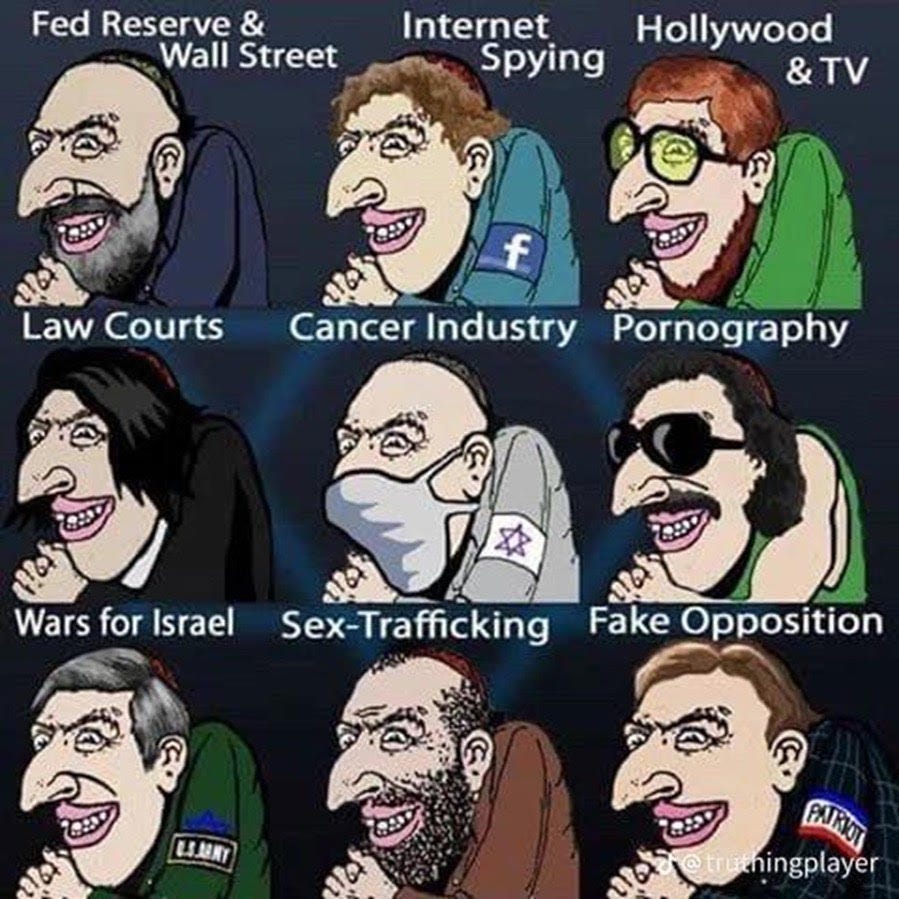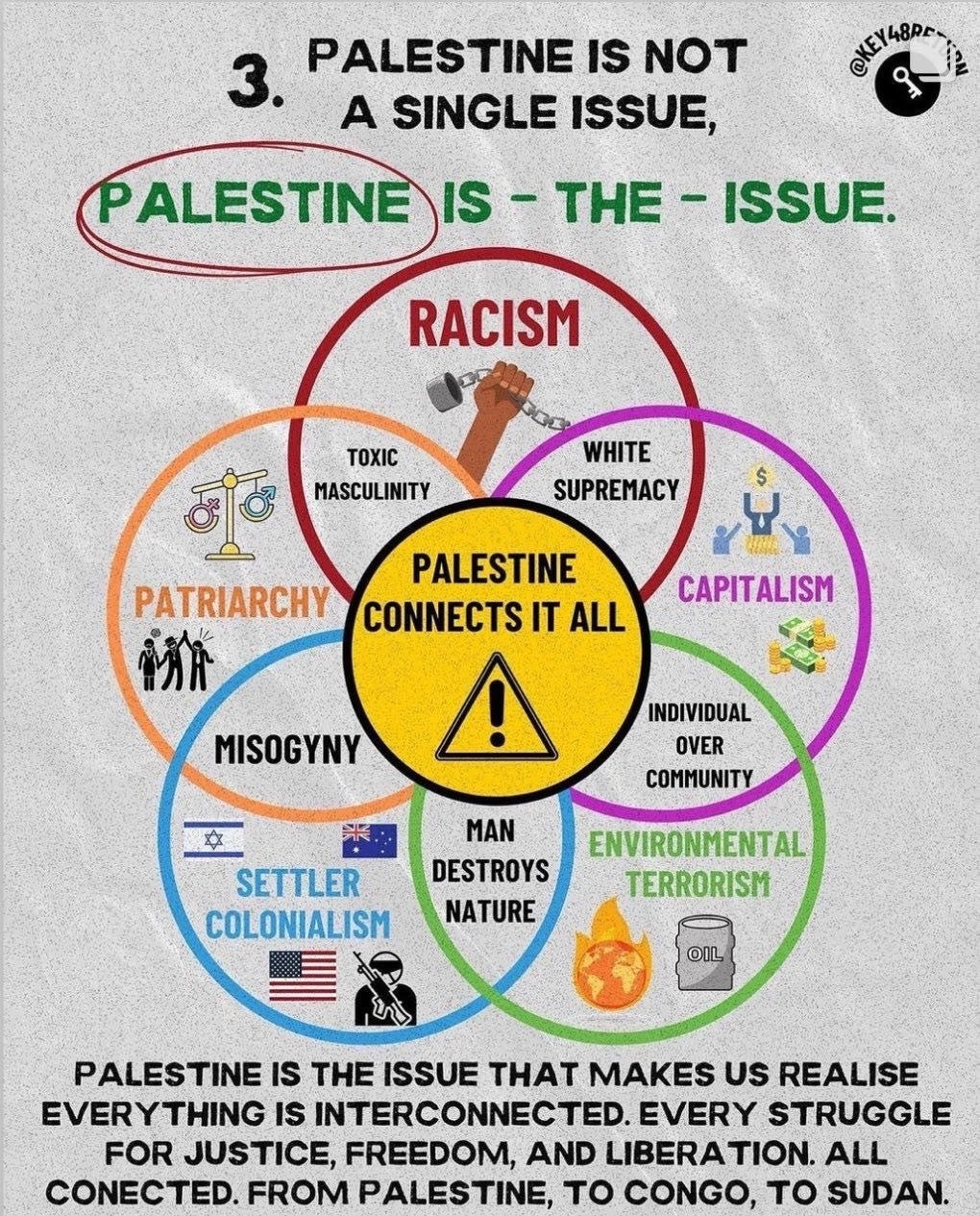The conspiracy trap
Anti-Jewish conspiracy myths have a unique ability to adapt and thrive in any environment, trapping the unaware in their flawed and fatal thinking. For people on the progressive left this is especially the case when these ideas are presented via the language of anti-Israel campaigning. It is as if, like Harry Potter donning his invisibility cloak, the antisemitism that ought to be apparent magically disappears.
In this light, I have been thinking this weekend about an antisemitic image that TikTok’s algorithm, in its infinite wisdom, recommended to my teenage son a couple of years ago. The image comprises a series of antisemitic cartoon faces derived from the ‘Happy Merchant’ meme, each ascribing a different social ill, political process, or American institution to a malign Jewish hand.
It’s a list of everything an American neo-Nazi might abhor about modern society: mainstream media and culture, capitalism and the rule of law, pornography and prostitution, Israel and pluralist democracy. And the single thread that links of these phenomena, according to this meme, is that the Jews are behind them all.
The reason this image came to mind this weekend is because of a different social media meme that made the same point from a radically different direction:
In this version, the list of phenomena to be hated and feared reflects the politics of the radical left rather than the extreme right: patriarchy, settler colonialism, environmental terrorism, racism and so on. But again, we are told that there is one single thing that connects them all, the locking nut that, if only it can be undone, would release freedom and justice for all: Palestine.
In practical terms this is obviously nonsense. There is no meaningful, concrete way in which Palestine connects toxic masculinity with the environment, or misogyny with capitalism. If Palestine really was to become free between the river and the sea, with Israel out of the picture, then judging by its likely rulers it would almost certainly be just another capitalist, patriarchal state. But that isn’t the point. This meme isn’t meant to be a serious analysis of the relationships between any of these things. It is just designed to sell a simple, and very old, idea: that the Jews stand between humanity and utopia.
Antisemitism has always been much more than a one-dimensional prejudice towards people who look, pray, eat and speak differently. Instead, it is an all-encompassing way of interpreting and explaining the world, a cosmic guide to uncovering the forces of evil that pollute humanity’s moral relationships. Jews and their money are often placed at the heart of this corruption by antisemites, which is why it feels especially revealing that the only two things to appear in both memes are Israel and capitalism.
Perhaps this is a coincidence. Maybe whoever designed this meme and all the people sharing it are blissfully unaware that they are walking in the path of anti-Jewish propagandists down the ages. But those who have taken upon themselves the task of leading and joining the global campaign against the world’s only Jewish state really ought to educate themselves about this history: which brings me to Ben Jamal, Director of the Palestine Solidarity Campaign.
On Saturday I retweeted a fascinating thread by Dr Robin Douglas, a historian of religions, exploring the philosophical tradition within which this meme sits (I don’t know Dr. Douglas, but I thought his explanation was worth sharing). Ben Jamal took umbrage at my retweet, describing it as “the wilful misuse of accusations of antisemitism”. I take “wilful misuse” to be an allegation of dishonesty, meaning that Jamal thinks I don’t really believe that meme is antisemitic. He’s wrong about that: I really do.
Jamal’s argument is that it is not antisemitic to address “links between systems of oppression”. And up to a point, he might be right: it isn’t antisemitic to address those links, unless your way of explaining these supposed links is to point a finger at the Jews. And this doesn’t change if your answer, instead of “the Jews”, is “Israel” or “Zionism”, because while the wording might differ, the underlying way of thinking is the same. There is no serious, meaningful way in which Israel is to blame for global patriarchy or for oppression in Congo, any more than Jews are to blame for pornography or the cancer industry. It only makes sense if all of these deplorable things trace back to a single, common cause; which is where all those antisemitic conspiracy myths do their work.
The meme that went viral in pro-Palestinian social media networks this weekend may not have included anything as grossly antisemitic as the Happy Merchant image to signal its anti-Jewish message, but that doesn’t change the fact that its meaning and message are the same. People on the left who consider themselves anti-racist nonetheless get sucked in to antisemitic ways of thinking, as long as they are cloaked in the language of progressive politics and social justice. And part of the reason this still happens is because leading figures in this movement, instead of educating themselves and their followers about the long and varied traditions of antisemitic thought, prefer to throw around accusations of dishonesty when people complain.





The unorthodox Feminist writer Mary Harrington recently coined the word 'Omnicause', in which "all contemporary radical causes seem somehow to have been absorbed into one. A protean animating energy seems to ingest every progressive issue it encounters, to create a kind of ever-spreading, all-encompassing omnicause."
I think there's something to in the notion of intersectionality, as a comprehensive worldview, which encourages this sort of thinking: everything bad is connected with everything else that's also bad and at root the problem is x. I don't think they even realise that what they're substuting in for 'x' is "the Jews" – they are doing it, but I don't think they consciously know they're doing it.
I'm thinking back to when Maxine Peake claimed that the American police learned from Israeli secret services how to kneel on George Floyd's neck. It's true that some police departments in the United States will do training exercises with Israeli police departments, just as they do with other countries. But it was the Israeli one that had to be guilty.
And I'm thinking also here of Slavoj Žižek's critique of populism in 2006. He argues that populism, because it inherently condenses social dysfunctions which occur on the structural or systematicatic levels into a figure of an enemy which explains and can be held responsible for the dysfunction, it necessarily always contains both an element of ideological displacement and a long-term Fascist tendency. I think we can expand that idea here in relation to antisemitism.
If the intersectional mindset emphasises that everything bad is fundamentally connected (if only you can discern the connections which others cannot); if what marks out antisemitism is its conspiratorialism; and if Žižek is correct that this line of thinking inherently relies on a kind of scapegoating mechanism à la Girard resulting in a long-term Fascism, then add in a few decades of propaganda via Soviet anti-Zionism and Muslim Brotherhood antisemitism, and I think you'd end up more or less where we are right now.
Conspiratorial thinking plus the scapegoating mechanism is more or less, imo, the essence of antisemitism. And when you combine left-wing populism with intersectionality plus those influences... well, I think you get what we have now.
The accusations of dishonesty are in and of themselves antisemitic, as the age-old trope about Jews always lying to achieve their goals rears its ugly head again. It is enduring and provides the basis for David Hirsh’s Livingstone Formulation.